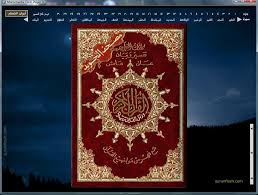"After every Salah and finishing of the Quran, I would pray "O Allah, give me the Taufiq to recite the Quran in my grave" and that is why I am praying.
Jewels of Quran
Isa bin Muhammad (Alaihir Rahmah) says that I once saw Abu Bakr bin Mujahid (Alaihir Rahmah) after his death in a dream reading the Holy Quran. I asked, "You have died, how are you reciting," upon which he said, "After every Salah and finishing of the Quran, I would pray "O Allah, give me the Taufiq to recite the Quran in my grave" and that is why I am praying." (Faizan-e-Sunnat)
Ahadith
The Holy Prophet said:
1) The best of you is he who learnt the Holy Quran and taught it to others. (Bukhari)
2) Undoubtedly, the heart gets rusted like metal gets rusted when water goes over it. The People asked, "How can they [hearts] be cleaned." The Prophet replied, "To remember death in abundance and to recite the Holy Quran." (Mishkat)
3) That chest which does not have any Quran in it is like an abandoned house. (Tirmizi, Darmi)
4) Whoever read the Quran and memorized it and belived its' Halal to be Halal and its Haram to be Haram [i.e., accepted it commandments of Halal and Haraam], Allah will accept the intercession for such 10 people on from him whom Hell had already become Wajib. (Tirmizi, Ibn-e-Majah)
5) Whoever is an expert in reciting the Holy Quran is with the Kiraman Katebeen and whoever reads the Quran with pauses and it is difficult for him, that is, his tounge does not move easily and he recites with difficutly for him there are two rewards. (Bahar-e-Shariat)
6) The one who has memorized Quran will be told to read and climb and recite with Tarteel (clear and distinct recitation) like you used to read with Tarteel in the Dunya; your place will be where you read your last Ayat. (Bahar-e-Shariat)
7) Allah says, "Whoever was kept busy with the [recitation] of Quran from my Zikr and asking me, I will give him better than those who I give to those who ask" and the excellence of the Word of Allah over all the other words is like the excellence of Allah over all his creation.
8) Learn the Quran and read it because whoever learned the Quran and read it and did Qayam with it is like a bag filled with Musk whose fragrance is spread everywhere and whoever learned the Quran and slept that is he did not do Qiyamul Layl is like a bag which is filled with Musk and its mouth has been closed. (Tirmizi, Ibn-e-Majah, Nisaee)
9) Read the Quran when you heart feels affection and attachment and when your heart becomes bored stand up that is stop reciting the Quran. (Saheeh Bukhari and Muslim)
10) Decorate the Quran with your (good) voices. (Mishkat)
11) O People of the Quran, do not make the Quran a pillow, that is do not be lazy and be careless, and read the Quran in the day and night like it is the Haq of Recitation, and spread it, that is, read with good voices or do not take compensation for it, and whatever is in it, reflect upon itso that you may attain success, and do not hurry in its reward because the reward for it is great (which will be given in the Akhirah). (Bahiqi)
Benefits of some Surahs. Benefits of Quran. How to recite Quran.
Rewards for certain Surahs and Ayahs
The Holy Prophet said:
1) Surah Fatiha is a cure from every illness. (Darmi, Bahiqi)
2) Do not make your home a graveyard, the Shaitan runs from the home in which Surah Baqrah is recited. (Sahih Muslim)
3) Whoever memorized the first ten ayahs of Surah Kahf will be saved the Dajjal. (Sahih Muslim)
4) Whoever recites Surah Kahf on the day of Jummah, there will be a Nur brightened for him between two Jummahs.
5) Everything has a heart and the heart of the Quran is Surah Yaseen, whoever read Yaseen, Allah will write the reward of reading the Quran ten times from him. (Tirmizi and Darmi)
6) Whoever reads Surah Yaseen for the pleasure of Allah, his past sins will be forgiven so read this near your deceased. (Bahiqi)
7) (Reading) Qul hu WAllahu Ahad (Surah Ikhlas) is equal to [reading] one third of the Quran.
8) Whoever read Ayatul Kursi after every Fard Salah, he will be under the protection and security of Allah. (Dailmi on the Authority of Sayeduna Ali)
9) (On the Day of Judgement) a caller will say O Recitor of Surah Inaam, come to Jannat for loving Surah Inaam and its recitation.
10) Surah Tabarak (Surah Mulk) saves one from Hell.
11) Whatever task is not begun with Bismillahir Rahamnir Raheem remains incomplete and unfinished.









